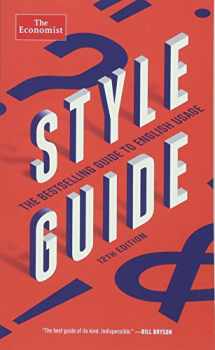
Style Guide (Economist Books)
ISBN-13:
9781610399814
ISBN-10:
1610399811
Edition:
12
Author:
The Economist
Publication date:
2018
Publisher:
The Economist
Format:
Paperback
288 pages
Category:
Communications
,
Business Skills
,
Reference
,
Words, Language & Grammar
FREE US shipping
Book details
ISBN-13:
9781610399814
ISBN-10:
1610399811
Edition:
12
Author:
The Economist
Publication date:
2018
Publisher:
The Economist
Format:
Paperback
288 pages
Category:
Communications
,
Business Skills
,
Reference
,
Words, Language & Grammar
Summary
Style Guide (Economist Books) (ISBN-13: 9781610399814 and ISBN-10: 1610399811), written by authors
The Economist, was published by The Economist in 2018.
With an overall rating of 4.4 stars, it's a notable title among other
Communications
(Business Skills, Reference, Words, Language & Grammar ) books. You can easily purchase or rent Style Guide (Economist Books) (Paperback, Used) from BooksRun,
along with many other new and used
Communications
books
and textbooks.
And, if you're looking to sell your copy, our current buyback offer is $0.86.
Description
This expanded twelfth edition of the bestselling guide to style is based on The Economist's own updated house style manual, and is an invaluable companion for everyone who wants to communicate with the clarity, style and precision for which The Economist is renowned.
As the introduction says, 'clarity of writing usually follows clarity of thought.'
The Economist Style Guide gives general advice on writing, points out common errors and clichés, offers guidance on consistent use of punctuation, abbreviations and capital letters and contains an exhaustive range of reference material--covering everything from accountancy ratios and stock market indices to laws of nature and science.
Some of the numerous useful rules and common mistakes pointed out in the guide include:
As the introduction says, 'clarity of writing usually follows clarity of thought.'
The Economist Style Guide gives general advice on writing, points out common errors and clichés, offers guidance on consistent use of punctuation, abbreviations and capital letters and contains an exhaustive range of reference material--covering everything from accountancy ratios and stock market indices to laws of nature and science.
Some of the numerous useful rules and common mistakes pointed out in the guide include:
- Which informs, that defines. This is the house that Jack built. But: This house, which Jack built, is now falling down.
- Discreet means circumspect or prudent; discrete means separate or distinct. Remember that "Questions are never indiscreet. Answers sometimes are" (Oscar Wilde).
- Flaunt means display, flout means disdain. If you flout this distinction you will flaunt your ignorance.
- Forgo means do without; forego means go before.
- Fortuitous means accidental, not fortunate or well-timed.
- Times: Take care. Three times more than X is four times as much as X.
- Full stops: Use plenty. They keep sentences short. This helps the reader.


We would LOVE it if you could help us and other readers by reviewing the book
Book review

Congratulations! We have received your book review.
{user}
{createdAt}
by {truncated_author}


